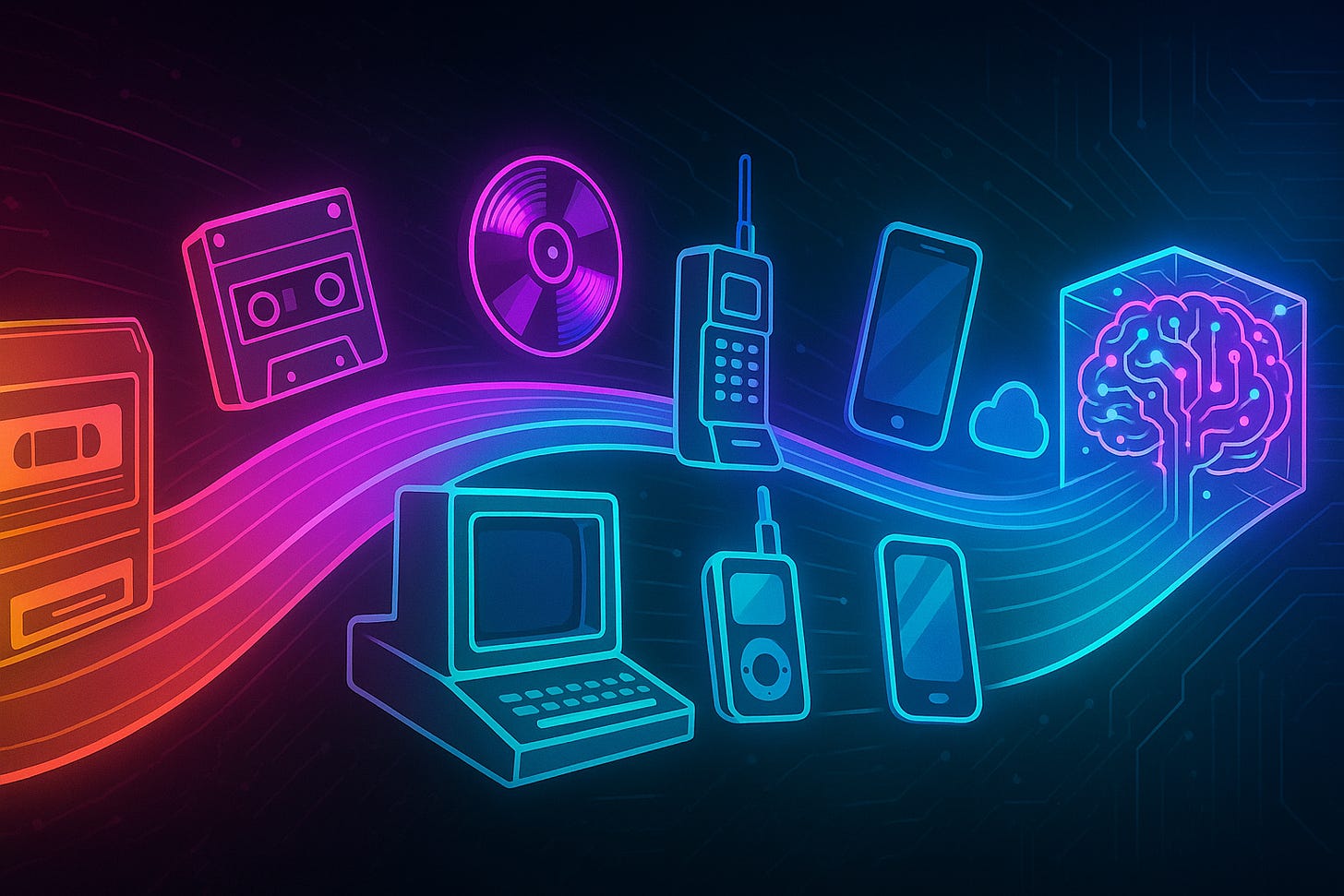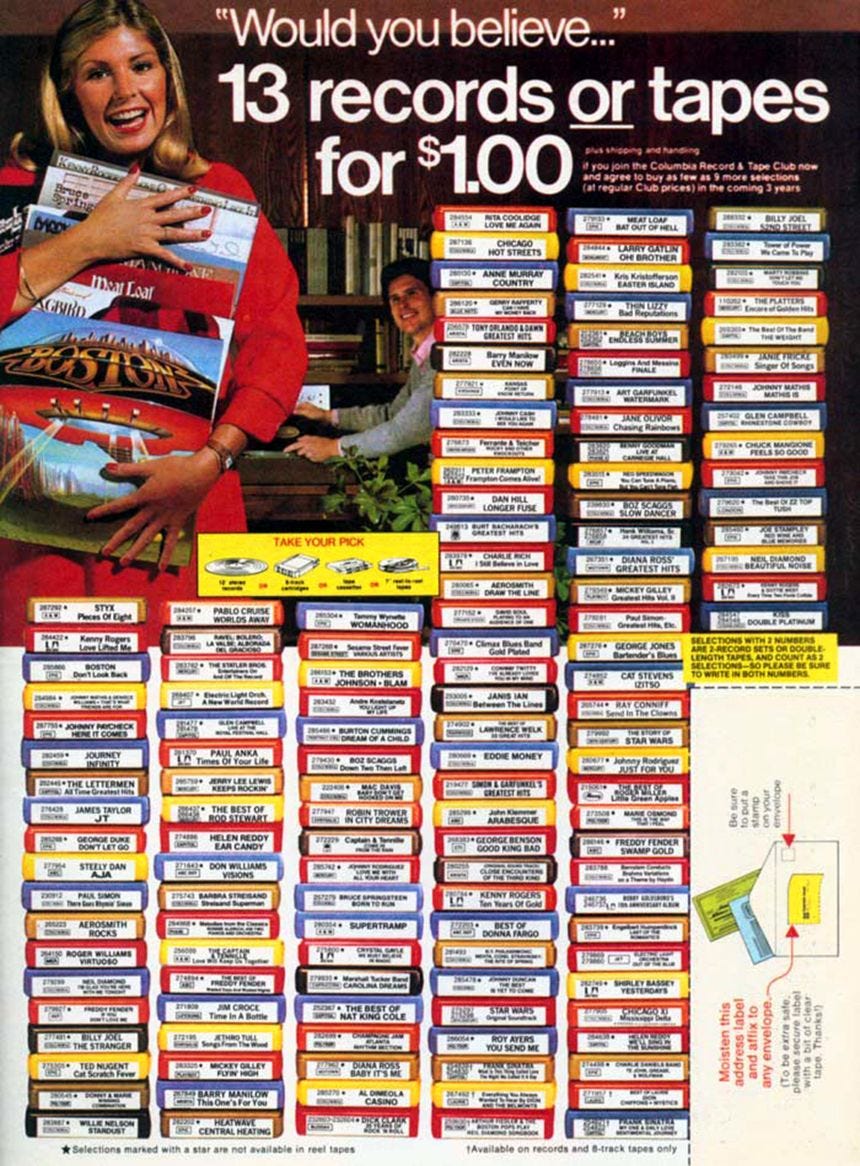From 8-Tracks to AI Agents
Orchestrating Tomorrow: What 50+ Years of Tech Evolution Taught Me About What's Next
The summer of 1980 smelled like hot vinyl and possibility. I was seven years old, carefully sliding my parents' copy of "Hotel California" into our wood-paneled 8-track player, watching the mechanical marvel pull the endless loop of tape through its guts. That satisfying ka-chunk as it switched tracks mid-song? That was my first lesson in accepting technology's imperfections while marveling at its magic.
Four decades later, I'm asking my AI assistant to analyze market trends while simultaneously generating creative content, and I can't help but trace the winding path that brought us here—through a graveyard of obsolete formats and revolutionary breakthroughs that each promised to change everything.
The Music Collection I Bought Multiple Times
Here's a confession that my generation shares: I've purchased the same album at least five times. First on vinyl (borrowed from parents, really), then 8-track, cassette for the Walkman era, CD when clarity became king, and finally... well, we stopped buying and started streaming. Each transition felt monumental, each format promising permanence.
Columbia House always helped me level up my collections. IYKYK.
The cassette era taught me about democratized creation—suddenly, we could make mixtapes, share our musical souls with crushes, create narratives through song sequences. The pause button became an art form as we tried to catch songs off the radio without the DJ's voice bleeding in. We were curators before we knew the word.
Then came CDs, and with them, the illusion of indestructibility. "Perfect sound forever," they promised. We believed them, rebuilding our collections once more, marveling at the ability to skip directly to track seven without fast-forwarding through six others.
The Napster Disruption: When Everything Changed
But nothing—nothing—prepared us for Napster in 1999. Here in Kansas City,, I watched my dial-up connection slowly pull music from someone's computer in Germany. It took 15 minutes to download one song, and we thought it was miraculous.
This wasn't just about free music. This was about witnessing the collapse of an entire industry's gates in real-time. The guardians of distribution were suddenly irrelevant. A 27-year-old with a laptop had more power than Tower Records.
There’s a great documentary out called, How Music Got Free, that I saw recently that made me think about this evolution. The music industry WAS NOT ready.
The pattern was set: Technology doesn't iterate—it erupts.
The Professional Evolution: From HTML Tables to AI Orchestration
My professional journey mirrors this musical one, but with higher stakes. In 1996, I hand-coded my first website using HTML tables for layout (forgive me, web standards enthusiasts). Every spacer GIF was placed with surgical precision. We thought we were architects; we were actually cave painters.
The progression came in waves:
The SMS/T9 Era taught us that communication would compress, that humans would adapt to technology's limitations until technology adapted to us. Remember typing "4-4-3-3-5-5-5-6" just to write "hello"? We learned patience.
SEO's emergence revealed that visibility was the new currency. Suddenly, everyone was a publisher, but being found became the challenge. We went from information scarcity to information obesity in a decade.
Mobile Marketing arrived like a dinner guest who ends up moving in. "Mobile-first" went from progressive thinking to table stakes. I watched businesses crumble because they insisted their customers would always browse on desktops.
Paid Search and Social Media Marketing democratized advertising while simultaneously making it more complex. A small business in Kansas City could now compete with Manhattan agencies—if they understood the algorithms.
Marketing Technologies exploded into a maze of 8,000+ solutions. We went from not enough tools to too many, from data scarcity to drowning in metrics.
Blockchain with Bitcoin promised to revolutionize and decentralize everything, delivered on some promises, and reminded us that not every technology needs to eat the world to matter. We are still learning it’s effectiveness with Web3.
The AI Inflection Point: Why This Time Really Is Different
And now, AI. But here's why this transition feels fundamentally different from all the others:
Every previous technology asked us to adapt to it. We learned its language, its limitations, its quirks. AI is the first technology that adapts to us. It speaks our language—literally.
In my entrepreneurial work, I've watched AI transform from a sophisticated calculator to something approaching a collaborative partner. Last week, I had an AI analyze customer feedback, identify patterns I'd missed, suggest product improvements, and draft the implementation plan—tasks that would have required a team of analysts just five years ago.
But the real revolution isn't in what AI can do—it's in who can do things with AI.
The Great Leveling: AI Agents as Universal Amplifiers
The pattern I've observed across 50+ years of technological evolution is this: Each wave democratizes what the previous wave gatekept. Napster democratized distribution. SEO democratized visibility. Social media democratized publishing.
AI agents are democratizing capability itself.
Consider what's happening right now:
A solo entrepreneur can have the analytical capability of a Fortune 500 company
A student in rural Kansas can access the same AI tools as someone at MIT
A small business can orchestrate complex workflows that once required entire departments
The moat isn't access anymore, it's imagination and application.
What's Next: The Agent Economy
Based on the patterns I've witnessed, here's what I see coming:
Autonomous Workflows: AI agents won't just respond to prompts; they'll anticipate needs. They'll run your business operations while you sleep, flagging only what requires human judgment.
Skill Hybridization: The most valuable professionals will be those who can orchestrate AI agents like a conductor leads an orchestra. Not replacing human skills, but amplifying them exponentially.
Micro-Personalization at Scale: Every interaction, product, and service will adapt in real-time to individual preferences. Mass production gives way to mass personalization.
The Trust Premium: As AI-generated content floods every channel, human verification and authentic connection will command premium value. The paradox: The more artificial intelligence we have, the more we'll value genuine human intelligence.
Lessons from the Journey
After watching industries rise and fall, formats become obsolete, and "permanent" solutions prove temporary, here's what I know:
Adopt early, but don't marry the method. Every technology I've embraced has eventually been replaced by something better.
The human element remains constant. Whether it's making a mixtape or training an AI model, we're still trying to connect, create, and contribute.
Resistance is expensive. Every business I've watched fail in these transitions failed because they fought the new reality instead of adapting to it.
The next disruption is already here—we just haven't recognized it yet.
The View from Here
As I sit in my Kansas City home office, no longer needing to rebuild my music collection (thank you, Spotify), I'm struck by the acceleration of change. It took 20 years to go from vinyl to CD. It took 5 years to go from CD to stealing, uh… downloading. Then onto streaming.
It only took 18 months to go from "AI is interesting" to "AI is essential."
The 8-track player that started my journey sits on my shelf—a museum piece that once represented the pinnacle of consumer technology. Next to it sits my laptop, running AI agents that would have seemed like magic to that seven-year-old pressing play on "Hotel California."
But here's the thing: It's still magic.
We're not just living through technological change. We're living through the greatest democratization of capability in human history. AI agents aren't just tools—they're levelers, enablers, amplifiers of human potential.
The first industrial revolution was in 1760, right? From handcraft to machines. And here we are 265 years later at the Fourth Industrial Revolution. These past 265 years have been a whirlwind of innovation. It’s mind boggling, honestly.
The kid who learned patience from 8-track's limitations is now orchestrating AI symphonies. And the most exciting part? We're just pressing play on this new era.
The next track is about to start. I can hear that familiar ka-chunk of transformation.
Are you ready for what comes next?
The journey continues. Each of us who've lived through these transitions carries lessons that inform how we'll navigate what's ahead. The technology changes, but the human capacity to adapt, create, and transform remains our greatest asset.
So maybe subscribe, comment, and/or click the like button? ❤️






